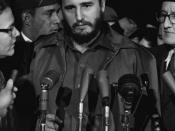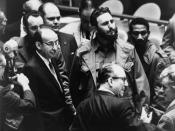"Fidel go ahead Hit the Yankees on the head". Of all things, this was the catchcry of thousands of Cubans marching about the Plaza de Revolucion, where Fidel Castro was yet to make another declaration, at the end of 1960. What prompted the expression of this attitude towards America by Cubans can be linked to a number of factors resulting from the foreign policies dictated by the Castro government, after the revolution that brought it to power in 1959. These foreign policies, which changed the nature of Cuba's relationship with the USA and Latin America and forged new ties with the USSR were significant in ensuring the permanence of the new regime because of the effects that they had on Cuba's economy, nationalism, military and political belief structure.
An inherent mistrust and dislike for Americans had slowly developed in Cuba since the establishment of the republic in 1902. The incorporation of the Platt Amendment in the constitution until the 1930's ensured that Cuba was an economic colony of the US.
Purnell's History of the 20th Century by AJP Taylor was able to support this with statistics of American companies, which were said to have owned 80% of public services, 40% of the sugar industry, 90% of haciendas or large farms and all oil refineries, along with UK firms. Additionally, Fulgensio Batista had initially been supported by the US and their level of involvement economically and politically was enough to credit them with the blame for the maintenance of Batista's corrupt government.
Playing on the beliefs of the Cuban people to gain popularity, Castro continually referred to the Americans as the "imperialist yankees" and was able to redistribute land to the public, under the Agrarian Reform Law of 1959, without compensating the former American owners. The nationalisation of the...



Foreign Policy
Nice flowing essay well done, good work.
3 out of 3 people found this comment useful.